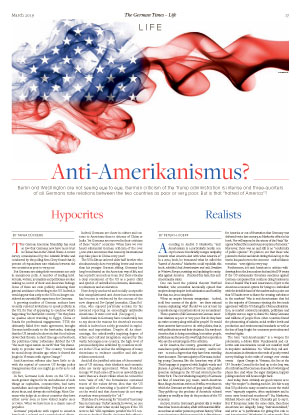Misguided accusations of anti-Americanism are an effective tool for stifling debate

According to Andrei S. Markovits, “anti-Americanism is a particularly murky concept because it invariably merges antipathy towards what America does with what America is.” In a 2004 book, he bemoaned what he called the “hatred of America.” Markovits could republish this book, subtitled Anti-Americanism and anti-Semitism in Western Europe, restating and updating the antipathy against America – if indeed this hate, this anti-Americanism exists.
One can heed the political theorist Herfried Münkler, who somewhat laconically opined that empires always inspire both admiration and hostility. But that, too, is too simplistic. When an empire foments antagonism – indeed, in all four corners of the globe – are there rational reasons explaining why? Should we not at least try to speak among our partners about our accusations?
Three-quarters of all Germans rate German-American relations as poor or very poor. But do they hate an entire country along with all its people? Or would these answers have more to do with politics, that is, with political actors and their decisions. It is surely not America that is doing something, but rather people, politicians and bosses of powerful global corporation who are the actual targets of the criticism.
As for America, the country, generations of Germans have openly admired this country – and its culture – to such a degree that they have been traveling there in masses. The vast majority of Germans, including young Germans, like the American way of life. Their language is peppered with English words and phrases. A growing number of German 11th-graders spend an exchange in the US and return home the better for it. The overwhelming majority of Germans are fans of American pop music, watch American films, binge American series on Netflix, even those in which the Germans are the bad guys (usually Nazis). They gobble up the products of America’s cultural industry as readily as they do the products of the US economy.
And yet, trust in Germany’s greatest ally is weaker than it has been in decades, albeit with material differences than at earlier points in postwar history. What some American politicians say and do is disturbing to many Germans, and they are venturing to express it. And why not? If democracy is about the freedom of individuals, the pursuit of happiness and the good life, then it also includes the freedom of speech. Indeed, whoever believes that things are progressing in the wrong direction has a democratic duty to speak up. This is as true in the US as it here in Europe.
There have been high points and low points in German-American cooperation. When John F. Kennedy spoke in Berlin in June 1963, 500,000 people cheered him on. After the towers of the World Trade Center collapsed, a Social Democratic politician spoke for millions of Germans and proclaimed: “Today, we are all Americans.” And when Barack Obama, still a candidate for the presidency in July 2008, held a rally in Berlin’s Tiergarten, he was joined by more than 200,000 individuals.
Every low, however, breeds more claims of anti-Americanism, even among Germany’s self-proclaimed transatlanticists. Yet those who criticized the war in Iraq and expressed their revulsion over the excesses of many soldiers there did not do so out of hate for America or out of frustration that Germany was defeated twice last century, as Markovits offers in his book. Nor will anyone let the crimes of the Nazis “disappear behind the monstrous perception of America.” Moreover, there was no and still is no “conformity of public opinion.” It’s plain to see that those who pointed to the lies and deceit during the lead-up to the war in Iraq and now to the outcome – radical Islamic terrorism – were right in every way.
Furthermore, is it anti-American to criticize withdrawing from the Iran nuclear deal and the INF treaty if the US ambassador threatens sanctions against German companies that continue doing business in Iran or Russia? Was it anti-American to object to the American economic system for being too enthralled with the invisible hand of the market and to point out that US banks were to blame for creating turbulence in the markets? Was is anti-Americanism that led to the majority of Germans rejecting the free trade agreement with the US during the Obama administration, as market-oriented journalists, politicians and lobbyists were so eager to claim? No. Many Germans and millions of people from other countries feared the plummeting of salaries, social welfare levels and production and environmental standards as well as the loss of long-fought-for consumer protections and workers’ rights.
The term “anti-Americanism” is a weapon for polemicists, a debate killer. Fundamental and collective anti-Americanism would not manifest itself in impulsive undulations. No. What they call anti-Americanism is oftentimes the result of poorly vetted survey findings in the wake of outrage over certain events – Agent Orange in Vietnam, the lies at the UN Security Council in the lead-up to the Iraq war, Abu Ghraib and the German chancellor’s wiretapped phone line. And when the anger dissipates, happier polling numbers will bounce right back.
And today, there certainly are good reasons as to why “the empire” is drawing such ire. Is it fair to say that US policies in many countries across the world were “expressly negative, often exploitative and in some cases brutal and murderous”? Yes, Markovits, Michael Moore and Noam Chomsky get to say it. But if Europeans make the same claim, then these Americans are allegedly being “instrumentalized,” and serve as “a justification for giving free rein to anti-Americanism” (Markovits). In other words: Pipe down, Europeans, when it comes to the US!
But how? What should we do? The US and its representatives for the most part set global policy and determine the global economy – in pursuit of their own interests, of course. Some of these interests are not in line with those of Europe, and what results is a competition over the future of our society, or our societies. At stake are fundamental questions of great significance to each individual person as well as to the collective population of planet Earth. At stake is the question of what sort of world we want and who gets what share of the yield of our collective toils. If proponents of economic liberalism, privatization and deregulation accuse their critics of anti-Americanism, it’s a bald attempt to muzzle them. And whatever it is, it’s not liberal.
Peter H. Koepf
is editor in chief of The German Times. Together with Franziska Schreiber he wrote the best-selling book Inside AfD. A Report by One Who Left, which was published in German in August.




